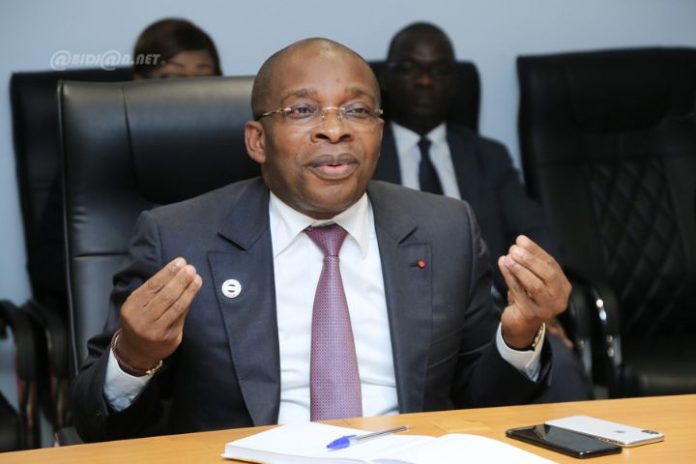After the shock of the health crisis, African banks have held up rather well. The year 2020 has accelerated the digitization of the profession, which represents as many opportunities as it does risks, especially in terms of data protection.
Banks and financial institutions very early on implemented business continuity plans in the face of the Covid-19 pandemic. What will their priorities be in the coming months, while unquestionably the year 2020 has been a game-changer? Three financial engineering specialists, brought together by i-conferences, bring their knowledge and thoughts.
Mounir Soussi is a manager at Dell Technology. He discusses the impact of the pandemic on the technology and financial industries. The past year has been marked by an acceleration in digitization; 80% of customers have participated in one way or another in the digital transformation.
This development is creating opportunities, whether in Mobile Banking, in online payment solutions, etc. In addition, banks and financial institutions are making greater use of technology in order to better assess the risks (fraud, bankruptcy, etc.) . At the same time, this leads to better rationalization of branches, in the distribution of banking and insurance products. In short, the pandemic has accelerated the digital transformation.
We are also seeing the emergence of new synergies between business processes in banking and technology solutions, which ultimately increases the resilience of the whole. And, again, we are seeing more banks and financial institutions keen to invest in human resource training. Knowledge is shared more, in the African bank, it is no longer reserved for senior executives.
Souleymane Diaw mentions the case of the National Economic Development Bank of Senegal, of which he is deputy director. This institution is of recent creation. His agility allowed him to adapt to the new behaviors described by Mounir Soussi. If only in dialogue with remote customers. Many managers have learned on the job.
The CEO describes something little mentioned: in many cases, patients with Covid-19 have been stigmatized, kept out of their office. It was therefore necessary for senior executives to adopt new attitudes in terms of human resources in order to leave no one behind for the long term. Not to mention the management of the workforce and the disease itself.
Costly blackmail online!
Any opportunity comes with risks that were not planned, notes Mounir Soussi. Which evokes very important cyber attacks, these last twelve months. This phenomenon is not a surprise. In 2019, the firm Accenture evoked losses of funds of the order of 5,200 billion dollars, in the world, in five years!
The impact of a single cyber attack on a business has increased to $13 million, on average. An attack means loss of income, credibility, image, legal and communication costs, etc. This impact has almost doubled in two years.
ESG estimates, for the MENA region, that four out of five servers have suffered attacks in 2020. While four out of five decision-makers in Africa do not feel armed to face such attacks. Africa, especially its financial and banking sectors, will come under increasing pressure from this risk.
This must be properly planned, so that uses progress under the best conditions, for example in the “Cloud”. Customer data is, by definition, very sensitive. It is not about going blindly into technologies that are not fully secure. Governments and central banks must be very strict on this point, which is not yet the case in Africa, while European countries are more advanced.
The Dell manager reveals some figures: 39% of attacks come from ramsonware, that is to say from online blackmail. And 92% of them are very difficult to detect. Two thirds of the victims suffered negative consequences from this blackmail. On average, hackers ask for $30,000!
Nevertheless, he continues, technology allows a balance between use and protection of data; African governance is therefore possible. The challenge now lies in the publication of the right texts, a harmonization of legislation. A citizen of Togo, for example, does not have to be hostage to a data host located outside his region.
Ibrahima Magassouba represents the National Bank of Guinea. He believes that since the start of the pandemic, and the disruption of global value chains, organizations or banking institutions that had a business and continuity plan have limited the devastating effects. Exposure to risk is a constant factor; banks are constantly working to develop the capacity to understand these risks and resilience.
Heterogeneous access to technologies!
It identifies five types of risk: cybernetic, health, regulatory, market, natural disaster. Each risk has three components: the threat (human or a hazard), vulnerability, impact. At the level of banks, cybernetic risks are major, he confirms. The threats of intrusion are very high in the financial sector, especially with the recent rise in teleworking.
This tool has allowed banks to “save the furniture” but it has security implications. Especially since banking systems are required to develop interfaces with other products, such as in mobile banking.
Exposure to technological risk is a dimension that needs to be taken more into account in future business continuity plans. Africa is not ahead on this point, but it is not inert; several initiatives adequately address systems security. While banks are gradually adopting the strictest security standards. As of December 31, 2020, most banks will be up to Swift technology standards, in particular.
Souleyma Diaw confirms: technology allows almost everything! The legislative framework must still follow. We must obtain an internationalization of legal frameworks, define bridges between the various laws. There are initiatives in West Africa, but they are still disparate. Senegal is rather well placed. The country amends its 2008 law; a new text should provide a better legal framework for data protection, artificial intelligence, and the use of the “Cloud”.
Users should know whether the data they communicate is stored in the West African space or not. It is certain, we will have to change, very quickly, our habits in the financial world. Which is not so easy, as the clienteles live in different decades!
Some are discovering the digital world, others are fully digital, others remain analog. All this in the same country … However, we do not offer the same product to a customer who has limited access to the Internet than to the one who has just acquired 5G.
Youth aware of technology!
Ibrahima Magassouba considers that the African initiatives are rather reassuring. In West Africa, we are coming to a single payment system. In this context, the security aspect is very relevant. Across Africa, there are also initiatives for a single payments system, the African Union is discussing. The financial arm of the Free Trade Area is becoming a reality; the structure will hold the shock, safe side. Interbank organizations are very efficient.
A gray area remains in “open banking”, which allows non-banking organizations to have sensitive data. It becomes necessary to define a precise regulatory framework. Who will need to be agile enough to adapt to a rapidly changing financial world.
Mounir Soussi (Dell Technologies) believes Africa has incredible resources, and one should be optimistic. Young people have a strong capacity for adaptation, it is from the youth that the answers will come to the problems of connection, of differentiated technologies, which we still meet on the continent.
An opinion shared by Souleyma Diaw who expects “a technological leap” to generalize the use of new tools in the population, including among the not so young.

